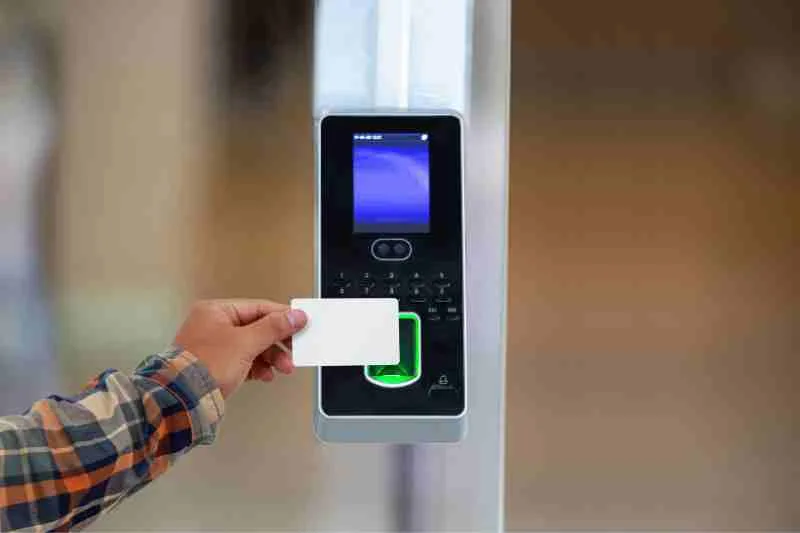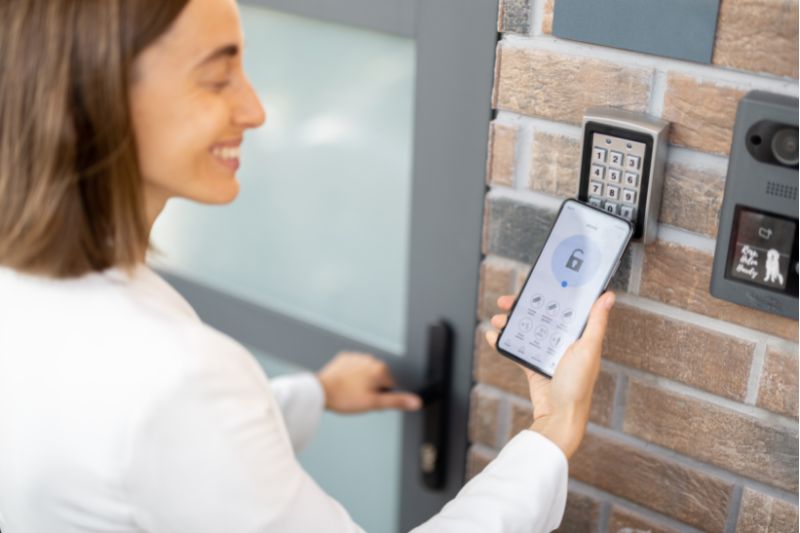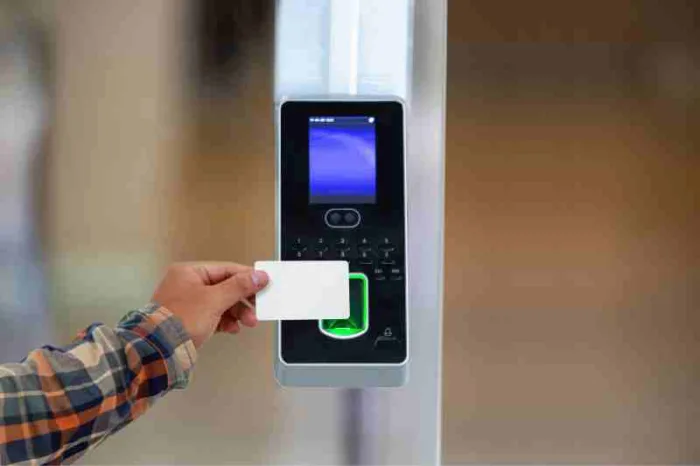Key takeaways
- Finding a number lock for a door that is easy to use and secure is essential.
- The three top number lock types are keypads, smart locks, and key card locks.
- Four things to consider before buying a number lock include ease of use and convenience, power source needs, existing hardware compatibility, and security concerns.

When securing your commercial property, you might want to go beyond the typical mechanical lock and key to keep your doors secure. Instead, consider purchasing number locks for doors, which are easy to use thanks to the commercial keypad door lock. But with so many locks on the market, it can be tough to make the best choice. So, we’ve put together this buyer’s guide.
In this post, we’ll provide practical tips on number locks based on your particular needs and budget. Then, we’ll cover what features to look for in a lock and offer alternatives.
What this post covers:
Comparing the 5 best number locks for doors
The 5 best number locks for doors include:
1. ButterflyMX Keypad
Whether you manage a multifamily or a commercial property, you can count on the ButterflyMX Keypad to create a convenient access experience for your residents.
ButterflyMX Keypad features include:
- Smartphone app functionality. With our intuitive ButterflyMX app, residents aren’t just limited to passcodes — they can unlock our Keypads with one simple swipe on their smartphones.
- Key fob and card support. By offering multiple ways to open the door, you can increase flexibility and ensure that your residents never get locked out.
- Weatherproofing. Our products are rated for weather, impact resistance, and dust. Count on us to empower residents to enter the building, no matter the circumstance.
- Smart lock integrations. We integrate with many of the most popular smart locks in the industry, allowing you to manage every piece of access hardware on your property from one dashboard — even if your tech comes from different manufacturers.
- Advanced PIN code management. Residents can text PIN codes to guests. Then, these codes expire, so a guest can’t have unauthorized access to your property.
- Integrated ecosystem. Other ButterflyMX access control offerings include our flagship Video Intercom, Card Readers, Elevator Controls, and Vehicle Readers — which allow you to mix and match to fit the unique needs of your property.
2. Kwikset SmartCode
Kwikset is a California-based lock company that’s been in operation for over 50 years.
SmartCode features include:
- Functionality with Zigbee smart hubs
- Aesthetic options like nickel and brass
- Home Connect software for smart home integrations
- Voice-activated locking and unlocking
- Remote locking and unlocking capabilities
3. Yale Assure
Founded in 1840, Yale has expanded from manufacturing old-school brass locks to internet-powered smart locks.
The Assure Yale door lock features include:
- Choose between keypad-first or lever-centered models
- Integrations with voice assistants like Siri and Alexa
- Temporary access code capabilities
- Yale Home app with features especially for residential units
Learn more about access control:
4. Cal-Royal CR6000
In addition to locks, Cal-Royal manufactures exit devices, door closers, and more.
The Cal-Royal has features like:
- RFID-enabled functionality for multiple ways to open the door
- Alternate credentials include fobs and keycards
- Weather resistance
- Anti-tampering touchscreen with automatic shutoff capabilities
- Automatic lockouts after five failed attempts
5. Schlage Keypad Deadbolt
The Schlage Keypad Deadbolt is one of the most effective options on the market.
Its features include:
- Ease of installation
- LED-backlit buttons to ensure that you can enter security codes at night
- Storing multiple PIN numbers so multiple people can have access
- Wear-resistant keypad buttons
- Simple setup that involves pre-programmed codes
- Durability rating ideal for residential properties
What is a number lock for doors?
A number lock for a door is a type of lock that has a keypad so that users can enter a PIN code to unlock the door instead of using a key. With this type of lock, users type in a numeric code, which they either set themselves or receive from building management.
You’ll often find number locks in residential buildings and commercial offices.
How does a number lock for doors work?
A number lock for doors works by electronically storing a set of passcodes. If a resident enters the correct passcode, the electronic circuitry inside of the lock verifies it and directs the physical mechanisms of the lock to disengage.
The best number locks for doors supports different technologies and multiple ways to open the door.
Three types of locks for door security:
- Keypad door lock. With this type of digital keypad door lock, tenants use a PIN code on the keypad to unlock doors.
- Smart lock. This lock is a smart device that allows access through smartphones, a keypad, or facial recognition technology.
- Key card door lock. Some number locks are multifaceted, allowing entry via a PIN, key card, or fob. These are usually found in areas with heavier foot traffic.
How do I choose the right number lock for my door?
Before you can purchase door locks for your building, you need to consider precisely what you need. This way, you can figure out which locks will meet your expectations.
Here’s what to consider when buying a number lock for a door:
- Ease of use and convenience
- Power source needs
- Existing hardware compatibility
- Security and safety concerns
Ease of use & convenience
Perhaps one of the top considerations to make when buying a new lock is ease of use and convenience.
Examples of ease of use include:
- Button size
- Technological sensitivity
- Inclusivity
- Display
- Customization and management
Power source needs
Some locks are battery-operated, but other electric door locks may require wiring. Before you buy, consider which power method is right for your building.
Your power source will depend on:
- Wiring availability. If you don’t have an electrical power source nearby (or you can’t afford to rewire your building), then a battery-operated door lock is best.
- Frequency. Next, consider how frequently the lock will be used. If it’s frequently used, then an electrical power source will be more reliable.
- Environment. Will your number lock be close to the exterior of your building? If so, a battery-operated lock will withstand temperature changes better than an alternative power source.

Existing hardware compatibility
When installing a lock in an existing door, consider hardware compatibility. For instance, is the door lock you’re considering compatible with the type of door strike plate that’s currently installed?
You can easily determine if your doors’ current locking mechanisms meet requirements by speaking with an installer.
Security & safety concerns
Lastly, understanding your security needs will help you decide on the right number lock for the doors in your building.
For instance, if you’re looking for a lock to an exterior door, a higher-level security lock will work best. This includes keypads, facial recognition technology, and smart locks.






